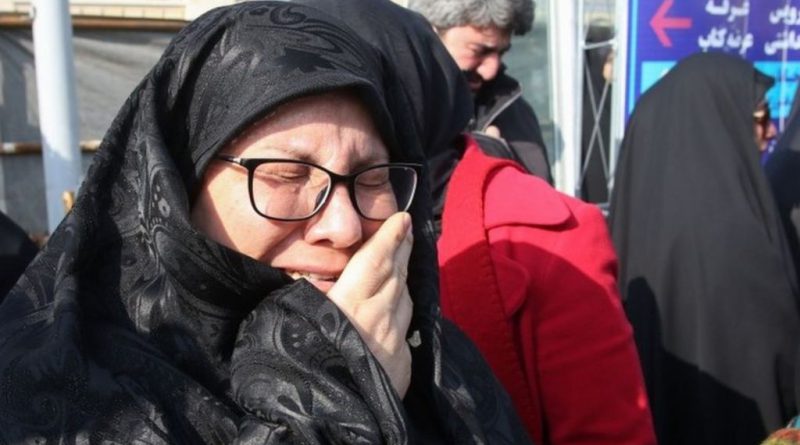Rapes and Sexual Violence: Shocking Stories of Iran’s Female Prisoners
by Shahed Alavi
Some of the female detainees have been so violently raped that their genitals have been injured and torn
Roya’s story of sexual harassment and threats during interrogations in a prison in southern Iran is just one of hundreds told by female prisoners, stories that testify to the systematic nature of sexual abuse and harassment of women in detention centers and prisons in the Islamic Republic. Female victims of sexual abuse are usually reluctant to talk about what they have gone through, which makes it even more important to take their stories seriously. Male prisoners in Iran are also subjected to sexual harassment and abuse, but it is women who are the main victims.
Roya says that her experience of sexual harassment did not end with the threat of rape by an ISIS man. “From the moment that I was arrested, I was humiliated and sexually insulted because of my gender by everybody in the system, from the interrogator and assistant prosecutor in that city to Behrouz Shah Mohammadi, the examining magistrate, and Judge Mohammad Moghiseh,” she says. “For instance, they told me ‘What were you doing there with so many men? You deserve to be harassed on the street.’ And during the interrogations I was targeted by all kinds of sexual insults and sexual innuendos.”
According to Roya, sometimes sexual harassment and torture continue even after interrogations and investigations have come to an end. “Gholamreza Ziaei, head of Evin Prison, is one of lowest and the most sordid people that I have met in my life,” she says. “Even the way he looks at you is lewd and galling. He has a very dirty mouth. For instance, whenever a female political prisoner requested something, he would tell her, in a very repulsive tone, ‘come to my room later so that I can tell you something in private.”
Sexual Harassment not Limited to Female Activists and Political Prisoners
Sexual harassment and threats are not limited to female civil rights and political activists. Ordinary detainees who have been arrested for various reasons and in a range of situations are subjected to this mistreatment. People who attend what they view to be non-political events can be targeted just as harshly as overtly political citizens. Azadeh is one of them. She was arrested on December 26, 2019 at Bibi Sakineh Cemetery in Karaj. She says that during the four days she was in detention she was both verbally harassed and threatened sexually.
Agents from Karaj Intelligence Bureau arrested Azadeh and a number of other women who attended a mourning ceremony in Bibi Sakineh Cemetery for Pouya Bakhtiari, who was killed during the November 2019 nationwide protests. After their arrest, Azadeh and her fellow detainees were taken to the city’s Morality Police. According to Azadeh, while they were being arrested a male security agent started rubbing against a female detainee with his legs, pressing his body against her.
Azadeh says that, during the interrogations, she was harassed and sexually insulted by the male interrogator: “While he was examining my mobile phone, the Morality Police interrogator kept telling me ‘you whore! You don’t have a husband, otherwise you would not be wandering the streets.”
Azadeh says that the harassment was not merely sexual. She and a few other detainees, all of whom had never been arrested before, were humiliated and terrorized as well. “The interrogator had a pistol in his hand and asked us, ‘do you think this is loaded or not?’ Then he aimed the pistol at us and pulled the trigger a few times. ‘Nah, this is empty,’ he then said. We were extremely terrified and even now that I talking about it I still feel terror.”
Female detainees are subjected to sexual abuse in the most painful way. Some of these shocking abuses have been documented in a report about November protests published on January 15 by Amnesty International: “The organization also received shocking allegations of sexual violence against at least one woman arbitrarily arrested by plainclothes security agents and detained for several hours in a police station. According to an informed source, while in detention, the woman was taken to a room where she was questioned by a security official who raped her by forcing her to perform oral sex on him and then attempted forced sexual intercourse.”
In recent years there have been many reports of verbal sexual harassment, threats and groping of female detainees in Iranian prisons, similar to those described by Roya and Azadeh, but the horrifying case reported by Amnesty International is reminiscent of what went on in Islamic Republic’s prisons and detention centers in the 1980s following the 1979 Islamic Revolution in Iran.
Abuse Began Right after the Islamic Revolution
One of the most important pieces of evidence for the widespread rape of female prisoners in the 1980s is a letter of protest by Ayatollah Hossein Ali Montazeri, Deputy Supreme Leader at the time, to Ayatollah Ruhollah Khomeini, founder of the Islamic Republic [Persian link]. “Do you know that in some of the prisons of the Islamic Republic they have forcibly violated young women?” he wrote in 1986. “Do you know that during interrogations of women they commonly use [sexual] vulgarities?”
In her book Women and the Islamic Culture Encyclopedia, Zhaleh Ahmadi, a medical doctor and scholar, writes [Persian link] that, before the great prison massacre of 1988, many female prisoners were subjected to sexual harassment and abuse and, in some cases, rape. And, in some of the rape cases, the women ended up marrying their jailors or committing suicide. One of the surviving witnesses to this violence is Nina Eghdam (Azar Alekan’an), who Ahmadi describes as “a female Kurdish activist who was arrested along with her nine-month-old baby in 1982 when she 18 and was raped in the Revolutionary Guards’ prison in Sanandaj,” the capital of Iranian Kurdistan.
A report on sexual violence against female political prisoners in the 1980s, published by Justice for Iran on January 9, 2012, documents many cases of rape and sexual torture throughout that decade, including systematic and repeated rape of virgin female political prisoners before executing them, forced marriages as a condition for freedom or for rescinding the death penalty, rape threats, sexual insults and groping to break the spirit of female prisoners [Persian link]. The second part of the same study continues the research into the 1990s and 2000s, documenting many instances of sexual violence against female prisoners in those two decades.
On July 29, 2009, Mehdi Karroubi, a reformist candidate in the disputed 2009 presidential election, wrote a letter to former president Hashemi Rafsanjani, who was then the chairman of the Expediency Council, to protest against sexual harassment and abuse of female detainees after the crackdown on protests that were sparked by the announcement of the official election results. “Some of the female detainees have been so violently raped that their genitals have been injured and torn,” he wrote in his letter [Persian link].
In August 2009, Reza Moini, head of the Iran and Afghanistan desk at Reporters Without Borders (RSF), mentioned the likelihood of rape in the case of Zahra Kazemi, the Iranian-Canadian photojournalist who was killed in 2003 while in custody in Evin Prison. “Shirin Ebadi [the Nobel Peace Laureate], who was one of the lawyers in the case, explicitly asked this question: If Kazemi was struck on the head, then why was a certain part of her clothing is bloody?” said Moini [Persian link].
Azadeh says that she knows her story as a non-political woman who has never engaged in activism in any significant way might terrify many women in Iran. “My bigger fear is the fate of hundreds of unknown women who were arrested during November protests or any other time under various excuses; because they are not well-known it is easier to abuse them,” she says. “We must talk about such experiences so that everybody can have an easier time talking about it and these tortures and abuses of women will be reduced.”
To protect the interviewees we have used aliases instead of their real names.
Article first published on Iran Wire.



